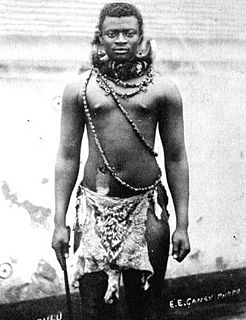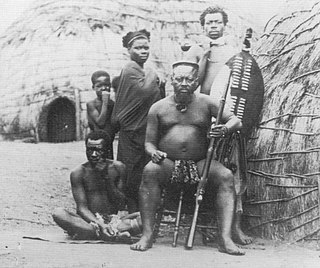
The Anglo-Zulu War was fought in 1879 between the British Empire and the Zulu Kingdom. Following the British North America Act of 1867 for the federation in Canada, by Lord Carnarvon, it was thought that similar political effort, coupled with military campaigns, might succeed with the African Kingdoms, tribal areas and Boer republics in South Africa. In 1874, Sir Bartle Frere was sent to South Africa as High Commissioner for the British Empire to effect such plans. Among the obstacles were the armed independent states of the South African Republic and the Kingdom of Zululand.

Ulundi, also known as Mahlabathini, is a town in the Zululand District Municipality. At one time the capital of Zulu Kingdom in South Africa and later the capital of the Bantustan of KwaZulu, Ulundi now lies in KwaZulu-Natal Province. The town now includes Ulundi Airport, a three-star hotel, and some museums amongst its sights. In the 2001 Census, the population of the town was recorded as 18,420.

Mangosuthu Gatsha Buthelezi is a South African politician and Zulu tribal leader who founded what became the Inkatha Freedom Party (IFP) in 1975, and was Chief Minister of the KwaZulu bantustan until 1994. He was Minister of Home Affairs of South Africa from 1994 to 2004. He is often referred to as Shenge, which is part of the Buthelezi clan praises. Buthelezi, a member of Zulu royalty, is also the Traditional Prime Minister of the Zulu nation.

Cetshwayo kaMpande was the king of the Zulu Kingdom from 1873 to 1879 and its leader during the Anglo-Zulu War of 1879. His name has been transliterated as Cetawayo, Cetewayo, Cetywajo and Ketchwayo. Cetshwayo consistently opposed the war and sought fruitlessly to make peace with the British, and was defeated and exiled following the Zulu defeat in the war. He was later allowed to return to Zululand, where he died in 1884.

Dinuzulu kaCetshwayo was the king of the Zulu nation from 20 May 1884 until his death in 1913. He succeeded his father Cetshwayo, who was the last king of the Zulus to be officially recognized as such by the British. Zululand had been broken up into thirteen smaller territories by the British government after the Anglo-Zulu War, and Cetshwayo, and subsequently Dinuzulu, administered one of them. The British later realized the futility of breaking up Zululand into the territories and restored Cetshwayo as paramount leader of the territories. However, they left one of Cetshwayo's relatives, Usibepu (Zibhebhu), alone with his lands intact. On 22 July 1883, Usibepu attacked Cetshwayo's new kraal in Ulundi, wounding the king and causing him to flee.

Cyprian Bhekuzulu Nyangayezizwe kaSolomon was the king of the Zulu nation from 1948 until his death at Nongoma in 1968. He succeeded his father, king Solomon kaDinuzulu, after a lengthy succession dispute which was only resolved in 1944. His uncle, Arthur Mshiyeni kaDinuzulu, functioned as regent during the succession dispute and Cyprian's minority.

Zibhebhu kaMaphitha Zulu (1841–1904) was a Zulu chief. After the defeat of the Zulu Kingdom by the British, he attempted to create his own independent kingdom. From 1883 to 1884, he fought the Zulu king Cetshwayo, inflicting a series of defeats on him.

Nongoma is a town in Zululand, KwaZulu-Natal, South Africa. It is the seat of the Nongoma Local Municipality. It is situated 300 km north of Durban and 56 km from Ulundi; it is surrounded by the Ngome Forest. It is a busy market town that serves a large surrounding area. It is assigned registration plate NND.

Ntshingwayo kaMahole of the Khoza was the commanding general (inDuna) of King Cetshwayo's Zulu Army during the first Anglo-Zulu War. He became known as Ntshingwayo kaMahole after being taken into foster care by Mahole of the Xhosa.

The Battle of Ulundi took place at the Zulu capital of Ulundi (Zulu:oNdini) on 4 July 1879 and was the last major battle of the Anglo-Zulu War. The British army broke the military power of the Zulu nation by defeating the main Zulu army and immediately afterwards capturing and burning the royal kraal of oNdini.
The Zulu royal family consists of the king of the Zulus, his consorts, and all of his legitimate descendants. The legitimate descendants of all previous kings are also sometimes considered to be members.

The Zulu Kingdom, sometimes referred to as the Zulu Empire or the Kingdom of Zululand, was a monarchy in Southern Africa that extended along the coast of the Indian Ocean from the Tugela River in the south to Pongola River in the north.
The uSuthu were the royalist faction in Zululand, more specifically they were the followers of Cetshwayo. The young Zulu warriors who clustered around prince Cetshwayo in 1856 during the Second Zulu Civil War formed the core of the uSuthu. Their name came from the Zulu war cry usuthu.

Dabulamanzi kaMpande was a Zulu commander for the Zulu kingdom in the Anglo-Zulu War. He is most noted for having commanded the Zulus at the Battle of Rorke's Drift. He was a half-brother of the Zulu king Cetshwayo kaMpande.
Lieutenant-Colonel Sir Marshal James Clarke was a British colonial administrator and an officer of the Royal Artillery. He was the first Resident Commissioner in Basutoland from 1884 to 1893; Resident Commissioner in Zululand from 1893 to 1898; and, following the botched Jameson Raid, the first Resident Commissioner in Southern Rhodesia from 1898 to 1905.

Ceza is a town in Zululand District Municipality in the KwaZulu-Natal province of South Africa.

The Battle of Ndondakusuka was the culmination of a succession struggle in the Zulu Kingdom between Cetshwayo and Mbuyazi, the two eldest sons of the king Mpande, often known as the Second Zulu Civil War. Mbuyazi was defeated at the battle and was killed, leaving Cetshwayo in de facto control of the kingdom, though his father remained king. Mbuyazi's followers were massacred in the aftermath of the battle, including five other sons of King Mpande.
Dinuzulu's Volunteers (1884) were a militant group of farmers that fought for Dinuzulu kaCetshwayo, the king of the Zulu nation, led by Louis Botha.

Magema Magwaza Fuze was the author of Abantu Abamnyama Lapa Bavela Ngakona, the first book in the Zulu language published by a native speaker of the language.

Sihayo kaXongo was a Zulu inKosi (chief). In some contemporary British documents he is referred to as Sirhayo or Sirayo. He was an inDuna (commander) of the iNdabakawombe iButho and supported Cetshwayo in the 1856 Zulu Civil War. Under Cetshwayo, Sihayo was a chief of a key territory on the border with the British Colony of Natal and had a seat on the iBandla. Sihayo was an Anglophile who wore European clothes and maintained friendly relations with trader James Rorke who lived nearby at Rorke's Drift. By 1864, Sihayo was head of the Qungebe tribe and that year agreed a new western border of the kingdom with Boer leader Marthinus Wessel Pretorius.














